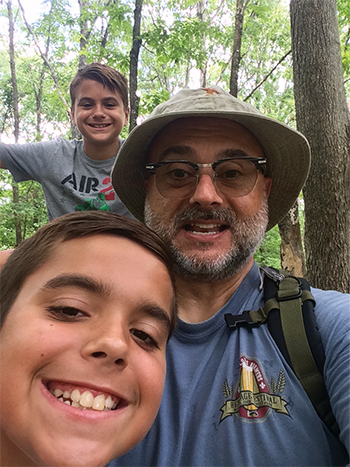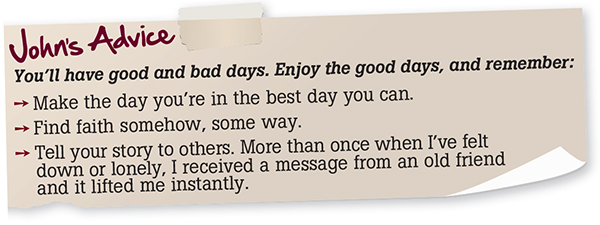Multiple Myeloma Survivor
Rekindled friendships and faith offer support

John Pumphrey, 55, credits a skilled and compassionate medical team, his strong faith and an unexpected support system with helping him move from a multiple myeloma diagnosis to remission in just under a year.
Feeling a little run down didn’t concern me. I chalked it up to being a single dad of two teenage boys, working long hours and the stress of being in a pandemic. I didn’t feel sick and I was in pretty good shape, which is what made a multiple myeloma diagnosis at 54 so shocking.
At my annual physical, my doctor noticed my blood pressure was higher than normal and my kidney function was a little off. He controlled my blood pressure with new meds, and he referred me to a kidney specialist. Surprisingly, results of those tests showed I was in Stage III kidney failure.
That really took me off guard. I wasn’t having any symptoms. How could I be in kidney failure?
The specialist ran more tests to look for conditions that could be causing it, including multiple myeloma — something I’d never heard of. Because that’s what the results pointed to, he referred me to an oncologist who ran more tests, including a bone marrow biopsy. That’s how I learned I had multiple myeloma.
The oncologist talked with me about possible treatments. We decided on a plan that included drug therapy and an autologous stem cell transplant. He expected my kidney issues to resolve as we treated the multiple myeloma.
I started an oral chemotherapy and a subcutaneous targeted therapy, then prepared for the stem cell transplant. It took about six hours to harvest my stem cells and daily trips to the hospital for a week for injections to get my body ready.
Physically, I felt ready, but I didn’t expect to have much support. I’m the sole provider for my boys. My parents are in their upper 80s and live four hours away. We’d recently downsized and moved to a new neighborhood so we didn’t have close friends nearby. My faith is strong and I prayed, but because of COVID I attended church online.
Needing support and prayers, I shared my diagnosis on Facebook. The outpouring of love was one of the biggest blessings. Friends from all over reached out. I’ve renewed many friendships, some as far back as grade school. And, I’m on numerous prayer lists. It truly gave me the boost I needed.
With the support and help of my ex-wife, I checked in to the hospital for the heavy chemotherapy and transplant.
For the next couple of weeks, I did nothing but rest up in the hospital. When my levels were safe enough for me to go out into the world, I was allowed to ring the bell and go home.
Ringing the bell was emotional, as was coming home to the boys. Because of COVID, I had only seen them through FaceTime. My parents stayed with them while I was in the hospital and didn’t leave until I’d regained my strength.
For the next 100 days, I was completely off treatment. My job was to get much-needed rest because the transplant wiped me out.
Once again, I had unexpected support. Our former neighbors really stepped up by sending meals weekly to make sure the boys and I had food along with gift cards for the grocery store, Subway, etc. The boys could run out and grab food whenever they wanted it without relying on me.
I was able to work remotely most of the time, but when I had to take time off for the transplant, my boss and team members covered for me.
At 100 days, my post-transplant test results showed my M-spike was improved. It was a partial response but not what we hoped for. It was, however, moving in the right direction. My oncologist encouraged me not to be disappointed.
I started chemotherapy (this time with a port) and targeted therapy along with a bone-strengthening drug and had regularly scheduled follow-ups to check my M-spike level.
At my last checkup, my oncologist told me I am as close as I can get to full remission. I’m moving to a lower dose of a maintenance medication, and my follow-ups can be further apart.
I lucked out with my doctor and nurses. They are incredible and make a horrible situation bearable — even a little enjoyable.
Being in good shape at diagnosis helped me to recover physically, and that is incentive to treat my body well. During recovery, my muscles really atrophied. I’m slowly building back muscle — walking to the mailbox, then halfway down the street. I’m looking forward to being able to hike, kayak and play golf again.
I try to live one day at a time and not think about a recurrence. My doctor assures me things are really happening for multiple myeloma treatment. There’s even potential for a cure, so my plan is to continue to manage it the best we can.



